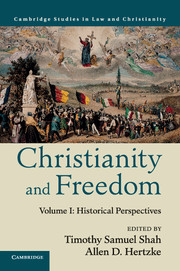Book contents
- Frontmatter
- The Religious Freedom Research Project
- Contents
- Contributing Authors
- Acknowledgments
- Introduction: Christianity and Freedom: Ancient Roots and Historical Innovations
- 1 The Roots of Religious Freedom in Early Christian Thought
- 2 The Christian Roots of Religious Freedom
- 3 Lactantius on Religious Liberty and His Influence on Constantine
- 4 Augustine and Religious Freedom
- 5 Christianity and the Roots of Human Dignity in Late Antiquity
- 6 Liberty of Conscience and Freedom of Religion in the Medieval Canonists and Theologians
- 7 Faith, Liberty, and the Defense of the Poor: Bishop Las Casas in the History of Human Rights
- 8 Calvinist Contributions to Freedom in Early Modern Europe
- 9 Constitutional Protection of the Freedom of Conscience in Colonial America: The Rhode Island and Pennsylvania Experiments
- 10 Christianity and Freedom in the American Founding
- 11 Vibrant Christian Pluralism and the Evolution and Defense of Religious Liberty in America
- 12 Orthodox Christian Contributions to Freedom: Historical Foundations, Contemporary Problematics
- 13 Christianity: A Straggler on the Road to Liberty?
- 14 Protestant Missionaries and the Centrality of Conversion Attempts for the Spread of Education, Printing, Colonial Reform, and Political Democracy
- 15 God and Freedom: Biblical Roots of the Western Idea of Liberty
- Index
1 - The Roots of Religious Freedom in Early Christian Thought
Published online by Cambridge University Press: 05 May 2016
- Frontmatter
- The Religious Freedom Research Project
- Contents
- Contributing Authors
- Acknowledgments
- Introduction: Christianity and Freedom: Ancient Roots and Historical Innovations
- 1 The Roots of Religious Freedom in Early Christian Thought
- 2 The Christian Roots of Religious Freedom
- 3 Lactantius on Religious Liberty and His Influence on Constantine
- 4 Augustine and Religious Freedom
- 5 Christianity and the Roots of Human Dignity in Late Antiquity
- 6 Liberty of Conscience and Freedom of Religion in the Medieval Canonists and Theologians
- 7 Faith, Liberty, and the Defense of the Poor: Bishop Las Casas in the History of Human Rights
- 8 Calvinist Contributions to Freedom in Early Modern Europe
- 9 Constitutional Protection of the Freedom of Conscience in Colonial America: The Rhode Island and Pennsylvania Experiments
- 10 Christianity and Freedom in the American Founding
- 11 Vibrant Christian Pluralism and the Evolution and Defense of Religious Liberty in America
- 12 Orthodox Christian Contributions to Freedom: Historical Foundations, Contemporary Problematics
- 13 Christianity: A Straggler on the Road to Liberty?
- 14 Protestant Missionaries and the Centrality of Conversion Attempts for the Spread of Education, Printing, Colonial Reform, and Political Democracy
- 15 God and Freedom: Biblical Roots of the Western Idea of Liberty
- Index
Summary
A certain established orthodoxy has settled over scholarly thinking concerning the relationship between the Christian church and political freedom. Consider the work of the political philosopher John Rawls, who has exerted a towering impact on a generation of political scientists, philosophers, legal scholars, practicing lawyers, public policy professionals, and judges. Rawls often begins his treatments of liberalism with what might be considered a Genesis narrative. Once upon a time, there was “Christianity,” which was “authoritarian,” “expansionist,” and dominated by a clerical elite who had special access to the Truth and to the means of Grace. Far from making positive intellectual or institutional contributions to the historical development of political freedom, in this near-canonical account, Christianity created intractable problems for freedom that only liberalism could solve. In this narrative, Christianity was the great moral and political problem to which Enlightenment liberalism was the necessary solution.
According to this startling view, which dates back at least to the Enlightenment and is evident in the work of John Rawls and many other influential scholars, the Christian church and political freedom are completely at odds. A major study by Perez Zagorin, for example, takes this view for granted: “[A] Christian theory of persecution … long antedated any concept or philosophy of religious toleration and freedom.” This view embeds a spirit of intolerance and militant proselytization in Christianity's DNA. And it believes doctrines of liberalism, democracy, and freedom of conscience had to emerge independently of and indeed in direct revolt against Christianity.
If this account of the conventional wisdom now prevailing in the academy may seem far-fetched, consider that in a recent issue of the academic journal Contemporary Sociology, a senior sociologist at the University of Pennsylvania summarized “the net effects of religion and faith on happiness.” What did he conclude? “[A] few thousand of years of horrible wars, genocide, slavery's ideology, sexual exploitation, torture, devaluing others as not human, terrorism, and organized hatred.” This widespread view encourages the belief that whatever persecution Christian communities experience must be deserved – must be a legitimate response to Christianity's own intolerance. The prominent New Testament scholar Luke Timothy Johnson considers this the real reason for Roman persecution of early Christianity. Johnson writes, “Rome's unusual intolerance in [Christianity's] case was a response to [Christianity's] own intolerance of diversity.”
- Type
- Chapter
- Information
- Christianity and Freedom , pp. 33 - 61Publisher: Cambridge University PressPrint publication year: 2016
- 1
- Cited by



